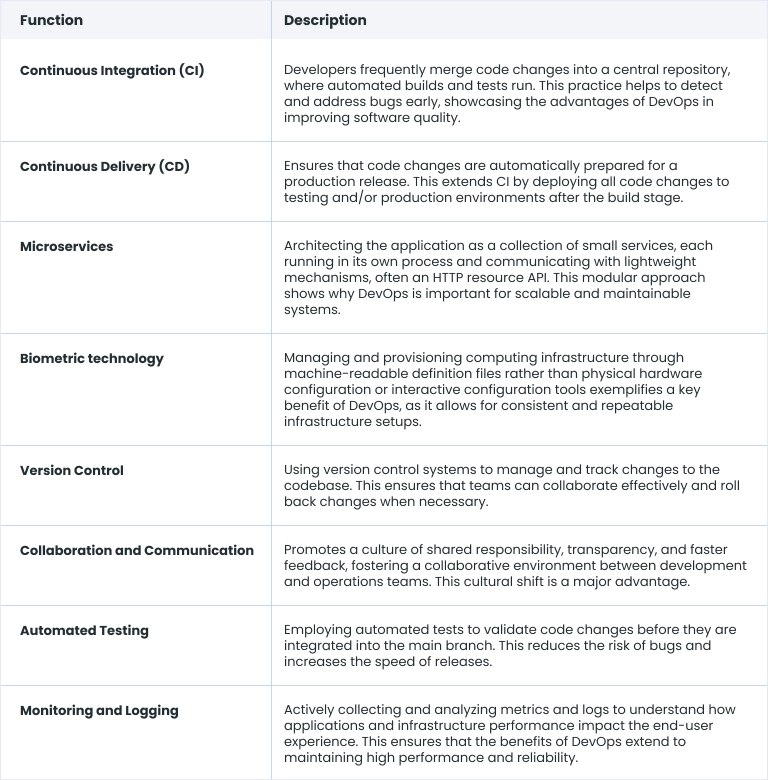Technology drives every aspect of modern businesses. To stay competitive, companies need more than just innovation; they need efficiency and seamless integration of development and operations.
This is where DevOps becomes handy. Understanding the benefits of DevOps is crucial for enhancing productivity and speeding up delivery processes in almost any company.
DevOps is not just a methodology but a cultural shift that bridges the gap between development and operations teams, fostering collaboration and improving workflow efficiency. By adopting DevOps practices, businesses can achieve faster software releases, reduced failure rates, and quicker recovery times, which are vital in today's tech world.
In this article, we will delve into the crucial role that DevOps plays in modern businesses. You will learn about its key practices and principles, how to determine if your business needs it, the functions and benefits it offers, the challenges it addresses, and how it differs from FinOps and MLOps.
But let's start this guide from the very beginning.
What is DevOps
DevOps is a set of practices that combines software development (Dev) and IT operations (Ops) with the aim of shortening the development lifecycle and providing continuous delivery of high-quality software. It emphasizes collaboration, communication, and integration between developers and IT operations professionals, breaking down the traditional silos that often exist between these two groups.
At its core, DevOps is about creating a culture where developers and operations teams work together throughout the entire software development process, from planning and coding to testing, deployment, and monitoring. This collaborative approach leads to faster problem-solving, more efficient workflows, and a quicker release of new features and updates.
One of the main benefits of DevOps is the ability to deliver software updates and features more rapidly and reliably. Consider a company that regularly updates its e-commerce platform. By implementing DevOps practices, the development and operations teams can work in tandem to release updates seamlessly, ensuring that new features, bug fixes, and security patches are deployed quickly without disrupting the user experience.
The adoption of DevOps can help businesses focus on automation. Automating repetitive tasks such as testing, integration, and deployment speeds up the process and reduces the risk of human error. This allows teams to focus on more strategic activities, driving innovation and improving overall productivity.
Market overview
The global DevOps market was valued at USD 14.3 billion in 2024 and is projected to reach USD 63.8 billion by 2033, growing at a CAGR of 19.4%. The primary drivers for this growth are the increasing demand for faster software delivery and enhanced operational efficiency. Today, organizations must swiftly deliver software updates and new features to remain competitive.

Regionally, North America dominated the market with a 38.5% share in 2023 and is expected to maintain its lead. Key factors include:
- Advanced IT infrastructure
- A strong focus on innovation
- A competitive business environment that promotes the adoption of DevOps practices and solutions
Additionally, the market can be segmented by components, deployment modes, enterprise sizes, and industry verticals. Solutions, particularly those involving automation and cloud technologies, are driving growth by improving software development and deployment processes.
As businesses increasingly adopt DevOps methodologies, the market is set to expand significantly across various sectors.

Key DevOps practices and principles
The DevOps concept is built on core principles that enhance the efficiency and effectiveness of software development and operations.
- Principle of flow: The principle of flow emphasizes the smooth and uninterrupted movement of work through the entire system. By adopting systems thinking, organizations can identify and eliminate bottlenecks, streamline processes, and enhance overall efficiency.
- Principle of feedback: Amplifying feedback loops is crucial for continuous improvement. This principle focuses on creating robust feedback mechanisms at every stage of the development and deployment process. Constant feedback helps identify issues quickly and make informed decisions.
- Principle of continuous learning: Continuous learning and experimentation are at the heart of the DevOps philosophy. Developing a learning culture encourages teams to constantly seek improvement, innovate, and adapt to new challenges. This involves promoting a mindset where failures are seen as opportunities for learning and growth.
By adopting DevOps, organizations can improve their processes, enhance collaboration, and drive innovation, leading to more efficient and effective software development and operations.
How to understand when you need DevOps?
The timely transition can provide significant business advantages, but understanding when to make this shift is crucial.
In this block, we will talk about some specific indicators that you should think about before using DevOps practices:
1. Frequent software releases
DevOps can streamline and speed up the process if your business requires frequent updates and quick delivery of new features. Continuous Integration (CI) and Continuous Delivery (CD) ensure that code changes are tested and deployed rapidly, reducing time-to-market.
These practices automate much of the manual work involved in testing and deployment, allowing for faster iteration and release cycles. This is particularly valuable for businesses that aim to stay ahead of competitors by quickly rolling out new features and updates.
2. High rate of failures and bugs
Persistent deployment issues or frequent production failures indicate a need for better integration and automated testing. DevOps practices help detect and resolve issues early, improving software reliability.
Automated testing ensures that each code change is thoroughly vetted before it reaches production, reducing the likelihood of bugs and failures. Continuous monitoring provides real-time insights into system performance, allowing for rapid identification and resolution of issues.
3. Slow time-to-market
Adopting DevOps practices can enhance efficiency if your product development cycle is slow. Automating repetitive tasks and streamlined workflows reduce delays, enabling faster delivery of new features and improvements.
DevOps methodologies focus on eliminating bottlenecks in the development pipeline, ensuring that each stage of the process flows smoothly and efficiently. This leads to shorter development cycles and quicker time to market, allowing businesses to respond rapidly to market demands and opportunities.
4. Scalability issues
When your infrastructure struggles to handle growing demands, DevOps can help manage scalable solutions through automation and improved workflows.
Infrastructure as Code (IaC) and microservices architecture enable consistent and scalable infrastructure management. IaC allows for automated and consistent infrastructure management, reducing the time and effort required to scale up resources. Microservices architecture breaks down applications into smaller, independent services that can be scaled individually, providing greater flexibility and efficiency.
5. Siloed teams
DevOps promotes collaboration and transparency if development and operations teams work in isolation, leading to miscommunication and delays. By fostering a culture of shared responsibility and open communication, DevOps bridges the gap between these teams.
Such a collaborative approach ensures that everybody is aligned with the same purpose and working together to achieve them. It reduces the friction and inefficiencies caused by siloed working practices, leading to more cohesive and efficient operations.
6. Need for continuous feedback
For businesses focused on continuous improvement and quick response to customer feedback, DevOps is the key. Continuous feedback loops ensure customer needs are promptly addressed, enhancing satisfaction.
DevOps practices automate feedback collection, enable frequent updates, and gather input at every development stage. This keeps businesses agile, responsive to customer needs, and ready to adapt to market changes.
By recognizing these signs, you can understand why we need DevOps and how it can drive operational efficiency, improve product quality, and accelerate delivery.
Who needs DevOps services?
Different businesses need DevOps for various reasons, ranging from improving efficiency to accelerating innovation. Here's a breakdown of who can benefit from DevOps services.
Startups and small businesses
Startups and small businesses must move quickly to stay competitive and innovative. Adopting DevOps can help streamline processes, reduce time to market, and ensure higher-quality releases. For these businesses, the need for DevOps is driven by the necessity to remain agile and responsive to market changes.
Continuous integration and delivery can accelerate development cycles, allowing startups to adapt to customer feedback and market demands quickly.
Medium-sized enterprises
Medium-sized enterprises scaling up their operations can greatly benefit from DevOps practices. The focus on automation, continuous integration, and continuous delivery helps these companies manage their growing infrastructure efficiently.
By adopting DevOps, they can maintain high performance and reliability, ensuring seamless growth. Automation reduces manual intervention, minimizes errors, and improves the overall speed and quality of software delivery, which is crucial for medium-sized businesses expanding their market presence.
Large corporations
Any kind of enterprise software development company with complex IT environments and numerous development teams can leverage DevOps to improve collaboration and efficiency across departments. For these organizations, understanding the necessity of DevOps is crucial for breaking down silos and promoting a culture of collaboration and shared responsibility.
DevOps tools and practices facilitate better communication and coordination among teams. They enable large corporations to deploy updates more frequently and reliably, ultimately enhancing their ability to innovate and respond to market changes.
Industries requiring rapid innovation
Industries such as finance, healthcare, and technology, where rapid innovation and compliance are critical, can significantly benefit from DevOps. These sectors require frequent updates, high security, and reliability, making DevOps indispensable.
For example, in the finance industry, DevOps helps in the quick deployment of new features while ensuring compliance with regulatory standards. In healthcare, DevOps enables the rapid development and deployment of applications that improve patient care and data management.
E-commerce and online services
E-commerce platforms and online services need DevOps to handle high availability and user satisfaction demands. Implementing DevOps ensures services are up-to-date, secure, and capable of managing high traffic, crucial for preventing revenue loss and protecting brand reputation.
DevOps enhances scalability and performance, allowing seamless management of traffic spikes during peak seasons. It enables faster deployment of new features, keeping the shopping experience fresh and boosting customer retention.
By evaluating these categories, you can determine if your business falls within the scope of those that can benefit from DevOps services.
Core functions of DevOps
Here are the functions that work together to streamline operations and enhance efficiency, showcasing the many benefits of DevOps you can get:

What modern challenges are being solved
DevOps addresses several modern software development and operations challenges, ensuring that businesses can deliver high-quality products efficiently. Here are some key ones:
- Speed and agility: Today, businesses need to deliver software updates quickly. Using DevOps automation practices like continuous integration and continuous delivery, you can enhance the speed of development and deployment, allowing rapid and reliable releases.
- Security: Integrating security into the development process, known as DevSecOps, ensures that security measures are built into every stage of the software lifecycle. This proactive approach to security reduces vulnerabilities and enhances the overall security posture of applications.
- Choosing the right metrics: Appropriate metrics are vital for measuring success and guiding improvements. DevOps emphasizes using metrics that reflect actual performance and user experience, ensuring that teams focus on meaningful outcomes.
- Complexity: As systems grow, their complexity can become overwhelming. DevOps practices help manage this complexity through automation, standardized processes, and modular architectures, making systems easier to understand and maintain.
- Resource optimization: Efficient resource management is crucial for cost savings and sustainability. DevOps optimizes resource utilization through automation and effective monitoring. Automated resource provisioning and scaling ensure that resources are used efficiently, reducing waste and lowering costs.
By addressing these challenges, DevOps helps businesses improve their development and operational processes, leading to more efficient, reliable, and secure software delivery.
DevOps, FinOps, and MLOps: What is the difference?
DevOps, FinOps, and MLOps each focus on different aspects of technology management.
Understanding the differences between these practices is essential for businesses looking to optimize their processes and improve efficiency. Below, we explore each practice in detail and explain how they uniquely contribute to the operational landscape.
DevOps: Enhancing development and operations
DevOps focuses on integrating software development (Dev) and IT operations (Ops) to streamline the development lifecycle and ensure continuous delivery of high-quality software. It involves practices like continuous integration (CI), where developers frequently merge code changes into a central repository with automated builds and tests.
Continuous delivery (CD) automates the release process, ensuring code changes are ready for deployment. Infrastructure as Code (IaC) manages infrastructure through code, enabling consistent and scalable environments. The goal is to improve collaboration, automate repetitive tasks, and reduce time-to-market.
FinOps: Optimizing cloud financial management
FinOps (Financial Operations) is about managing and optimizing cloud spending to maximize value from cloud investments. It brings together cross-functional teams, including finance, operations, and engineering, to collaborate on financial decisions related to cloud usage. Key practices include:
- Visibility: Providing detailed insights into cloud costs and usage patterns to identify spending trends.
- Optimization: Implementing cost-saving measures such as rightsizing resources, choosing the right pricing models, and eliminating waste.
- Accountability: Ensuring teams are responsible for their cloud expenses, fostering a culture of cost-awareness and informed decision-making.
Ultimately, FinOps aims to balance cost, speed, and quality to achieve financial efficiency in the cloud.
MLOps: Streamlining machine learning operations
MLOps (Machine Learning Operations) integrates machine learning (ML) with DevOps principles to manage and streamline the entire ML lifecycle . It focuses on automating and enhancing the processes of developing, deploying, and maintaining ML models. Key practices include:
- Model versioning: Tracking different versions of ML models to manage updates and improvements.
- Automated pipelines: Creating automated workflows for data processing, model training, and deployment to ensure consistency and reliability.
- Monitoring and maintenance: Continuous monitoring of ML models in production to ensure they perform as expected and retraining them as necessary.
MLOps aims to operationalize ML, making it scalable and reliable while improving collaboration between data scientists and operations teams.
Key differences
While DevOps enhances the collaboration and efficiency of software development models and methodologies with IT operations, FinOps focuses on financial management and optimization of cloud resources. MLOps is dedicated to managing the lifecycle of machine learning models, ensuring their reliability and scalability.
Each discipline addresses specific challenges and employs unique practices to improve efficiency, collaboration, and outcomes in their respective areas, highlighting the diverse applications of DevOps in modern business.
Optimizing DTx platform for B2B integration
We streamlined client onboarding and integration with third-party systems to improve scalability and operational efficiency.
How Binariks can help
At Binariks, we provide comprehensive platform development services that streamline software development and deployment processes. Our team of experts leverages industry best practices to ensure that our clients significantly improve their operational efficiency and agility.
Our approach is meticulous, beginning with a comprehensive assessment of your current processes to identify even the smallest areas for improvement. We then craft a customized DevOps strategy that is perfectly aligned with your business goals.
Using advanced tools and techniques, we implement solutions that enhance collaboration, automate workflows, and improve efficiency. This involves the adoption of continuous integration, continuous delivery, infrastructure as code, and automated testing to ensure seamless operations.
Adopting DevOps practices can transform your business by enhancing collaboration, streamlining processes, and improving efficiency. Whether you face frequent software releases, high failure rates, slow time-to-market, or scalability issues, DevOps offers solutions tailored to modern challenges.
And by partnering with Binariks , you can achieve greater agility, efficiency, and reliability in your software development and operations.
FAQ
Share

